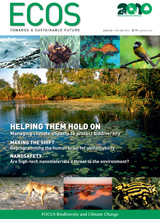
|
Published:
Warmest decade on record: Bureau’s 2009 review
The Bureau of Meteorology’s annual climate review for 2009 delivered what some regard as the most comprehensive data yet signalling a marked change in the Australian climate.

|
|
Satellite image showing forest areas (red-brown) burnt during the Black Saturday bushfires, February 2009. Credit: CSIRO
|
Last year will be remembered by many Australians for its intense bushfires, record heatwaves, dust-storms, flooding and continuing drought. The Bureau noted in its review that 2009 was Australia’s second warmest year since high-quality records began in 1910, being an estimated 0.90˚C above the 30-year average benchmark of 1961–1990.
High temperatures were especially notable in the south-east during the second half of the year, with Australia, Victoria, South Australia and NSW all recording their warmest July–December periods on record.
Globally, the World Meteorological Organization advised that 2009 was expected to be the globe’s fifth warmest year on record (about 0.44°C above the 1961–90 average). A cooler-than-average global mean temperature has not been recorded since 1985. Increasing global mean temperatures derived from instrumental measurements are consistent with other independent indicators of climate change, such as reductions in sea-ice and snow cover, and record high global sea levels.
The WMO indicated the last decade was also the globe’s warmest on record, a fact reflected in Australian data. The decade was the nation’s warmest on record at 0.48°C above the 1961–90 average. In Australia, each decade since the 1940s has been warmer than the preceding decade.
‘This suggests an apparent shift in Australia’s climate from one characterised by natural variability to one increasingly characterised by a trend to warmer temperatures,’ commented the Bureau’s Dr David Jones.
Heatwaves hit Adelaide
Extreme heatwaves occurred across much of southern Australia during late January/early February 2009, resulting in a new Melbourne maximum temperature record of 46.4°C, new State maximum temperature records for Victoria (48.8°C at Hopetoun) and Tasmania (42.2°C at Scamander), and contributing to the Black Saturday bushfires.
An unusual winter-time heatwave occurred during August over large parts of inland Australia and resulted in Australia’s warmest August on record. A third prolonged heatwave occurred during November across central and south-east Australia, leading to a record eight consecutive days of maximum temperatures above 35°C in Adelaide.
Dr Jones said there are clear upward trends in the number of hot events, and downward trends in the number of cold events (over the period 1960 to date). This is consistent with the background of global warming.
Rainfall
Based on preliminary data, the overall Australian mean rainfall total for 2009 was 453 mm, slightly less than the long-term average (1961–90) of 464 mm. Above-average rainfall in January and February, especially in the northern tropics, was followed by dry conditions from March onwards, with the March–November total being the 10th lowest on record for Australia.
A dry year in the south-east and south-west of mainland Australia has prolonged the multi-year meteorological drought in those regions.
During July–October 2009, serious rainfall deficiencies were experienced over large areas of Queensland and isolated parts of NSW, consistent with the development of an El Niño event during this time. The unusually dry and warm winter was associated with a series of dust-storms across eastern New South Wales and south-east Queensland in September and early October.
Despite the long dry, several short-term flood events occurred in eastern Australia in 2009. Timely rainfall across southern Australia in winter and early spring resulted in record falls in south-east Tasmania and eased water shortages for some agricultural regions and the urban water supplies of Adelaide, Canberra and Melbourne. The year ended with further flooding in parts of NSW and Queensland.
More information:
Bureau of Meteorology’s
‘recent climate’ web page,
www.bom.gov.au/climate/current/index.shtml
CSIRO climate questions, science facts page, www.csiro.au/resources/Climate-questions-science-facts.html



